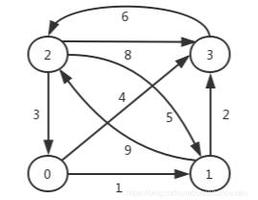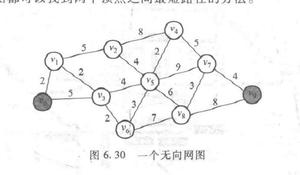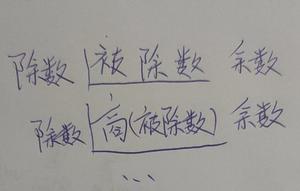最短路径的 Bellman-Ford 算法
Bellman-Ford 算法用于找到从源顶点到任何其他顶点的最小距离。该算法与 Dijkstra 算法的主要区别在于,在 Dijkstra 算法中我们无法处理负权重,但在这里我们可以轻松处理。
Bellman-Ford 算法以自下而上的方式找到距离。首先,它找到路径中只有一条边的那些距离。之后增加路径长度以找到所有可能的解决方案。
输入和输出
Input:The cost matrix of the graph:
0 6 ∞ 7 ∞
∞ 0 5 8 -4
∞ -2 0 ∞ ∞
∞ ∞ -3 0 9
2 ∞ 7 ∞ 0
Output:
源顶点: 2
Vert: 0 1 2 3 4
Dist: -4 -2 0 3 -6
Pred: 4 2 -1 0 1
The graph has no negative edge cycle
算法
bellmanFord(dist, pred, source)
输入 -距离列表、前驱列表和源顶点。
输出 -当发现负循环时为真。
BeginiCount := 1
maxEdge := n * (n - 1) / 2 //n 是顶点数
for all vertices v of the graph, do
dist[v] := ∞
pred[v] := ϕ
done
dist[source] := 0
eCount := number of edges present in the graph
create edge list named edgeList
while iCount < n, do
for i := 0 to eCount, do
if dist[edgeList[i].v] > dist[edgeList[i].u] + (cost[u,v] for edge i) dist[edgeList[i].v] > dist[edgeList[i].u] + (cost[u,v] for edge i) pred[edgeList[i].v] := edgeList[i].u
done
done
iCount := iCount + 1
for all vertices i in the graph, do
if dist[edgeList[i].v] > dist[edgeList[i].u] + (cost[u,v] for edge i),
then return true
done
return false
End
示例
#include<iostream>输出结果#include<iomanip>
#define V 5
#define INF 999
using namespace std;
//图(有向)顶点 5 的成本矩阵
int costMat[V][V] = {
{0, 6, INF, 7, INF},
{INF, 0, 5, 8, -4},
{INF, -2, 0, INF, INF},
{INF, INF, -3, 0, 9},
{2, INF, 7, INF, 0}
};
typedef struct {
int u, v, cost;
}edge;
int isDiagraph() {
//检查图是否为有向图
int i, j;
for(i = 0; i<V; i++) {
for(j = 0; j<V; j++) {
if(costMat[i][j] != costMat[j][i]) {
return 1; //图是有向的
}
}
}
return 0;//图是无向的
}
int makeEdgeList(edge *eList) {
//从图的边创建边列表
int count = -1;
if(isDiagraph()) {
for(int i = 0; i<V; i++) {
for(int j = 0; j<V; j++) {
if(costMat[i][j] != 0 && costMat[i][j] != INF) {
count++; //当图有向时找到边
eList[count].u = i; eList[count].v = j;
eList[count].cost = costMat[i][j];
}
}
}
}else {
for(int i = 0; i<V; i++) {
for(int j = 0; j<i; j++) {
if(costMat[i][j] != INF) {
count++; //图无向时的边查找
eList[count].u = i; eList[count].v = j;
eList[count].cost = costMat[i][j];
}
}
}
}
return count+1;
}
int bellmanFord(int *dist, int *pred,int src) {
int icount = 1, ecount, max = V*(V-1)/2;
edge edgeList[max];
for(int i = 0; i<V; i++) {
dist[i] = INF; //初始化为无穷大
pred[i] = -1; //没有找到前任。
}
dist[src] = 0;//对于起始顶点,距离为 0
ecount = makeEdgeList(edgeList); //边列表形成
while(icount < V) { //迭代次数为 (Vertex - 1)
for(int i = 0; i<ecount; i++) {
if(dist[edgeList[i].v] > dist[edgeList[i].u] + costMat[edgeList[i].u][edgeList[i].v]) { //放松边缘并设置前任
dist[edgeList[i].v] = dist[edgeList[i].u] + costMat[edgeList[i].u][edgeList[i].v];
pred[edgeList[i].v] = edgeList[i].u;
}
}
icount++;
}
//负循环测试
for(int i = 0; i<ecount; i++) {
if(dist[edgeList[i].v] > dist[edgeList[i].u] + costMat[edgeList[i].u][edgeList[i].v]) {
return 1; //表示图形有负循环
}
}
return 0; //无负循环
}
void display(int *dist, int *pred) {
cout << "Vert: ";
for(int i = 0; i<V; i++)
cout <<setw(3) << i << " ";
cout << endl;
cout << "Dist: ";
for(int i = 0; i<V; i++)
cout << setw(3) << dist[i] << " ";
cout << endl;
cout << "Pred: ";
for(int i = 0; i<V; i++)
cout << setw(3) << pred[i] << " ";
cout << endl;
}
int main() {
int dist[V], pred[V], source, report;
source = 2;
report = bellmanFord(dist, pred, source);
cout << "源顶点: " << source<<endl;
display(dist, pred);
if(report)
cout << "The graph has a negative edge cycle" << endl;
else
cout << "The graph has no negative edge cycle" << endl;
}
源顶点: 2Vert: 0 1 2 3 4
Dist: -4 -2 0 3 -6
Pred: 4 2 -1 0 1
The graph has no negative edge cycle
以上是 最短路径的 Bellman-Ford 算法 的全部内容, 来源链接: utcz.com/z/351653.html







